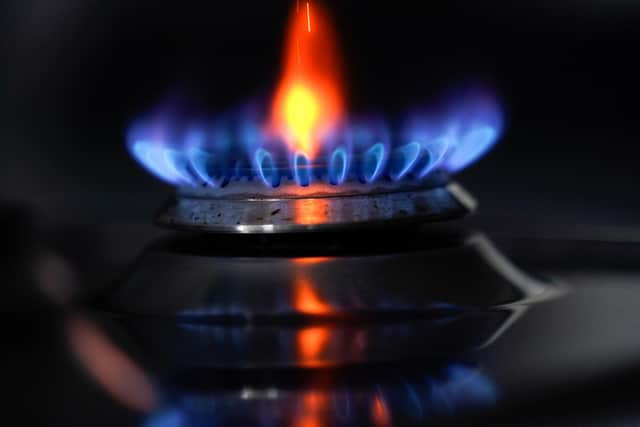How to build more certainty into your finances - Sarah Coles
Most of us are wrestling with the fact that there’s just not enough money to go around at the moment, so it was a massively insensitive time for a friend to collar me to share his financial problem: apparently he has too much money and can’t decide what to do with it.
None of us want to hear from this kind of friend right now, but his dilemma highlighted an aspect of financial planning that’s becoming increasingly important.


My friend had just been given a pay rise.
Advertisement
Hide AdAdvertisement
Hide AdHis wife wants him to use the extra cash to pay down the mortgage, but he argues that this makes no sense from a mathematical perspective.
He’s paying 2.5% on his mortgage, so if he invested the money instead, as long as he makes more than 2.5% a year after charges, he’ll end up better off.
She understands the maths perfectly well, but disagrees. For her it’s all about certainty.
The big issue facing us at the moment isn’t just inflation – it’s also that we don’t know what’s going to happen in future – to everything from our expenses, to the cost of borrowing, the price of keeping a roof over our heads, and our jobs.
Advertisement
Hide AdAdvertisement
Hide AdThere’s so much we can’t be sure about in life that trying to get some certainty is taking up more space in our financial decisions.
While we know prices are likely to keep rising, we can’t be sure how fast they’ll rise or for how long.
The things pushing prices up – from rising energy and oil prices, to soaring food costs and supply chain problems – are exacerbated by entirely unpredictable forces, like the invasion of Ukraine and lockdowns in China.
Meanwhile, the Bank of England has been raising interest rates to try to keep a lid on inflation, which introduces uncertainty into our future borrowing costs too.
Advertisement
Hide AdAdvertisement
Hide AdAnyone on a variable rate mortgage will have seen their monthly payments rise significantly, while credit card providers have been passing on rate rises, and the cost of new loans is increasing too.
It means we don’t know how much our borrowing is going to cost us in future.
For those who rent, there’s no certainty over this either.
With Zoopla figures showing rents up 11% in a year, we can’t be sure that when it’s time to renew our contract, we’ll be able to afford to stay where we are.
Given the high cost of moving, this could leave us with an enormous headache.
We may also have to face more risk around jobs.
Advertisement
Hide AdAdvertisement
Hide AdAll this inflation means we’re spending a small fortune on the essentials, and having to cut back elsewhere, which is taking its toll on businesses – in March GDP fell back 0.1%.
Employers are already battling with rising costs of their own, so falling sales could mean more of them going under, and people losing work.
In this kind of environment, with ambiguity in every corner of our finances, certainty becomes incredibly valuable.
This means it’s well worth considering where you can inject more of it into your plans.
Advertisement
Hide AdAdvertisement
Hide AdOne of the most effective steps is to fix your mortgage rate. It’s why 74% of mortgages are fixed, and among those taking out a deal since 2019, 96% of them have opted for a fix.
The proportion of people choosing to fix for five years is also growing, and has hit 45%.
This is partly because the gap between two-year and five-year fixed rate mortgages is narrowing, and partly because we want to be able to guarantee what our mortgage will cost us for longer.
For those who have investments, including pensions, diversification can help protect you in uncertain times.
Advertisement
Hide AdAdvertisement
Hide AdThe nature of the beast is that there are no guarantees: we take on the risk of short-term volatility for the potential growth over the long term.
However, building a diverse portfolio means you’re not over-exposed in any one area, so poor performance in one investment may be offset by better performance elsewhere.
We can also build in some wiggle room to our budgets, so we know that even when prices rise, we can afford them.
This means drawing up a budget and working out where we can squeeze some of the spending out of our lives.
Advertisement
Hide AdAdvertisement
Hide AdThe extra cash can be used to build one of the most important protections in uncertain times – an emergency savings fund of three to six months’ worth of essential expenses, so you have somewhere to turn when you’re caught out by the unexpected.
Meanwhile my friend will be investing his extra cash. It doesn’t come as an enormous shock that certainty means nothing to him, because in terms of risk, he’s down the ‘base-jumping while ordering a mixed meat kebab at midnight’ end of the spectrum.
Personally, I’m much more cautious, and have far more people relying on me, so I’ll be doing everything I can to build more certainty into my finances. I’ll probably steer clear of that late-night kebab too.
Sarah Coles is a personal finance analyst at Hargreaves Lansdown
